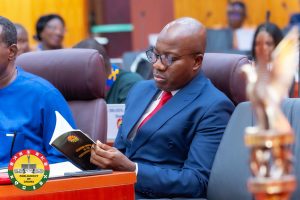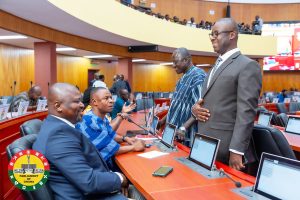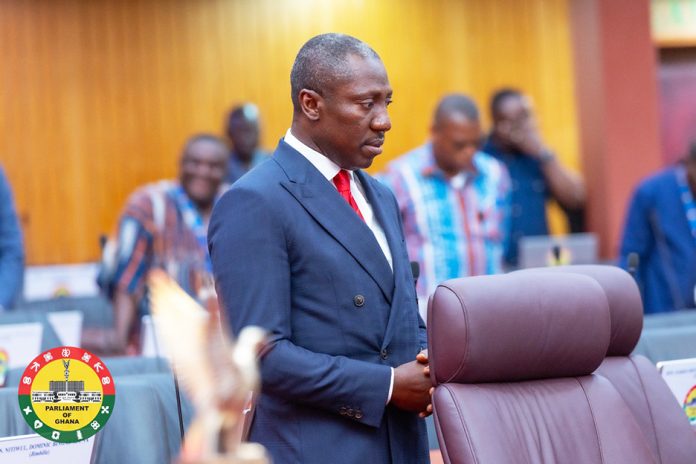A growing storm is brewing in Ghana’s Parliament after Minority Leader, Osahen Alexander Kwamena Afenyo-Markin, raised alarm over what he described as a “secret executive arrangement” between the Government of Ghana and the United States to receive deportees without parliamentary scrutiny.

The issue, now dominating political circles, has reignited the constitutional debate on how far the Executive can act in international affairs without legislative ratification, and whether such actions undermine Ghana’s sovereignty, accountability and rule of law.
Addressing the House during the opening of the third meeting of the first session of the Ninth Parliament, Afenyo-Markin accused the Executive of by-passing Parliament, in what he termed “a grave violation of Article 75 of the 1992 Constitution.”
“This is not merely about deportees, it is about national dignity and constitutional fidelity. Article 75(2) is clear: any international agreement executed on behalf of the Republic requires the prior approval of Parliament. If we allow this to go unchallenged, we risk normalising executive impunity,” he said.
The arrangement, according to reports, involves the temporary reception of 14 deported West African nationals from the United States, including Nigerians and a Gambian, who were reportedly processed in Ghana before being repatriated to their home countries under ECOWAS free-movement protocols.

President John Dramani Mahama, responding to questions at a press briefing recently explained that the move was a regional humanitarian gesture aligned with ECOWAS mobility rules.
“We were approached by the U.S. to accept third-party nationals being removed from their jurisdiction,” Mahama clarified and added that, “as members of ECOWAS, we agreed to temporarily receive West African nationals since they are entitled to visa-free entry under sub-regional protocols.”
Yet critics insist the source and terms of the agreement, including whether Ghana assumed legal or security responsibility for the deportees remain unclear.
Déjà Vu: Echoes of Guantanamo Bay Controversy
The development has drawn parallels with Ghana’s 2016 decision to host two former Guantanamo Bay detainees, which provoked widespread national backlash.
In June 2017, Ghana’s Supreme Court ruled that the Mahama administration had acted unconstitutionally by implementing the U.S. transfer without parliamentary approval, citing Article 75(2) as the constitutional benchmark for such international agreements.
Afenyo-Markin invoked that ruling to remind the House that Ghana’s democracy rests on institutional accountability, not expedient diplomacy.
“This is the second time in less than a decade that a major foreign agreement has sidestepped parliamentary ratification. Are we learning nothing from history?
The 2017 ruling was meant to prevent exactly this, an executive statecraft that evades constitutional control,” he said.
Legal experts agree that the ruling established a clear precedent: all agreements with foreign states or international bodies must be ratified by Parliament to attain legal validity.
Majority Defends Executive Diplomacy
But Majority Leader, Mahama Ayariga, defended the government’s decision, arguing that the agreement was pragmatic, not political, and yielded tangible diplomatic benefits.
“The arrangement with the United States was mutually beneficial. It helped secure the lifting of long-standing U.S. visa restrictions on Ghanaian citizens, a relief for our traders, students and families who rely on international mobility,” he contended.
Mahama Ayariga further disclosed that the Ministry of Foreign Affairs has submitted a number of pending international agreements to Parliament for ratification, including accords with Algeria, Angola and Serbia.
He, however, conceded that the deportee agreement presents “legal ambiguities” requiring further clarification.
“If the legal advice to this House is that parliamentary ratification is necessary, we will comply,” Ayariga said.
“But we must balance sovereignty with diplomacy,” he added.
Meanwhile, two new MPs, Bernard Bediako Baidoo and Professor Alidu Seidu were sworn in by Speaker Bagbin to replace the late Ernest Yaw Kumi and Ibrahim Murtala Mohammed for the Akwatia and Tamale Central constituencies respectively.
For more news, join The Chronicle Newspaper channel on WhatsApp: https://whatsapp.com/channel/0029VbBSs55E50UqNPvSOm2z









